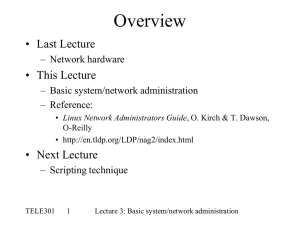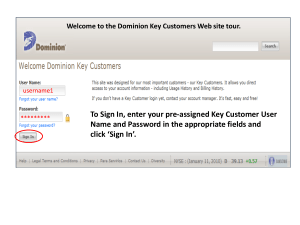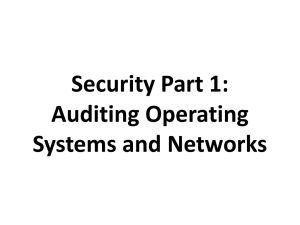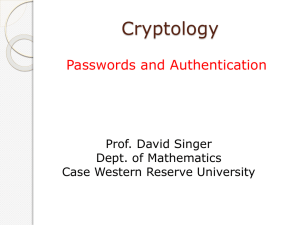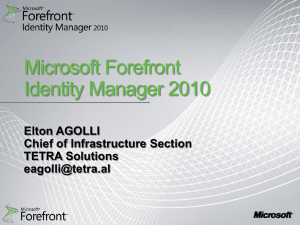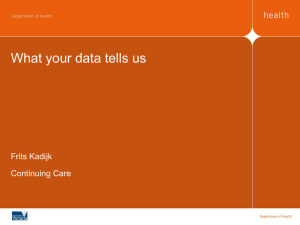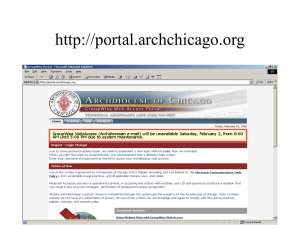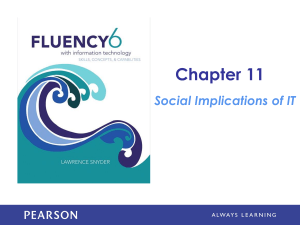Authentication through Password Protection
advertisement
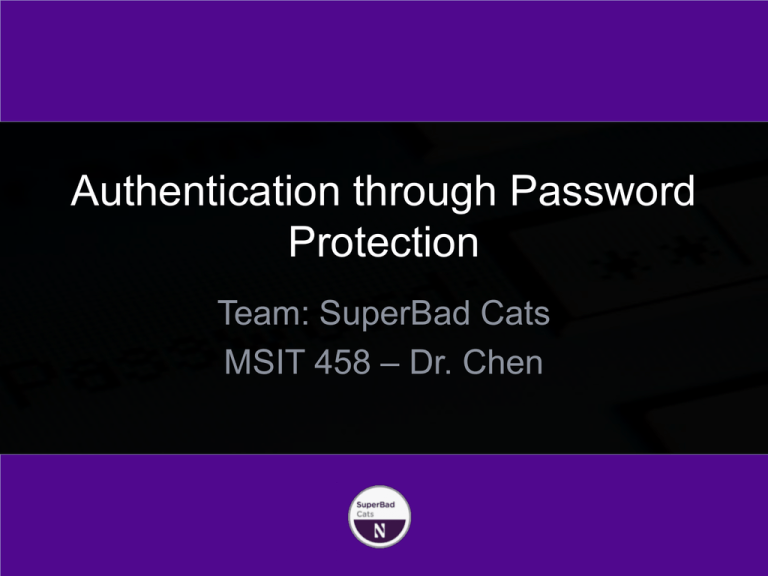
Authentication through Password Protection Team: SuperBad Cats MSIT 458 – Dr. Chen Background to the Problem: • Companies require password protection on many important systems within their company • Various systems may have differing password requirements – Requiring users to create and recall different passwords for different systems • Various systems may be used only sparingly by certain users – Users may forget their password after a period of non-use • Companies often require a new password after a given period of time – Requiring users to create and recall different passwords for different systems Password Reset User Support: • Call support Metrics (authenticity and validation) – – – – Time Spent on Resets Quantity of Resets per Year Cost per call Why they call • Web-based password reset advantages (setup by users with challenge questions) – – – – Confidentiality Authenticity Integrity Availability Problem: • Problems at the Company Level – Too many different passwords – Can’t remember passwords – Lack of Support – Too easy • Problems at the user level – Can't remember answers to challenge questions – Don't know the password complexity rules In Summary: Maintaining multiple passwords for a single user to access necessary systems results in excessive work time lost and cost to the company • • • • • • Password Complexity: Sample Company Enforce password history 24 passwords remembered Maximum password age 90 days Minimum password age 1 days Minimum password length 8 characters Password Dictionary Blacklist "%Company Name%” Password must meet complexity requirements Enabled (next slide) Password Complexity: Sample Company – Not contain the user's account name or parts of the user's full name that exceed two consecutive characters – Be at least eight characters in length – Contain characters from three of the following four categories: • • • • English uppercase characters (A through Z) English lowercase characters (a through z) Base 10 digits (0 through 9) Non-alphabetic characters (for example, !, $, #, %) – Complexity requirements are enforced when passwords are created or changed. Order of Magnitude By adding character complexity and length requirements, an administrator increases the amount of time a brute force attack will take on a system by orders of magnitude. This should be taken into consideration when setting up corporate passwords standards and requirements. Order of Magnitude Order of Magnitude Potential Solutions: • Identity Management Software • Leverage a unified Directory Service • Password Synchronization • Other Options: Single Sign, On, Biometric, RSA Token, Near Field Communication (NFC), RFID, Social Media Identity Management Software • IdM solutions provide automated creation, provisioning and projection of user accounts to a directory services solution. – Examples: Forefront Identity Mgr, Novell Identity Mgmt Solution, Oracle Leverage a Unified Directory Service A unified directory service is a single location where all user objects reside. This streamlines the management and control of access and authorization. – Microsoft Active Directory – Active Directory Federation Services (ADFS) Password Synchronization PCNS and other synchronization services leverage replication services and API’s to update and synchronize user passwords in unmanaged systems or environments – Password Change Notification Service (PCNS) Case Study Company X was looking into implementing a solution to improve their security while simplifying their password setup, maintenance and customer support. Here’s how they achieved this objective…. Company X Business Requirements • Legacy domain was an older version of Active Directory • Company X is a typical enterprise company, with approximately 100k users. • The directory services would need to accommodate approximately 500k objects • Large number of Windows based clients in the current infrastructure • Integration capability with current communication technology being implemented Company X Decision • There are many ways to select a Directory Services (DS) platform: – The reason for selecting Active Directory focused around the number of existing Windows based clients and the communication technology being implemented. • Company’s that sell DS products offer several different pricing models, and can vary in cost from as little as $500k, to upwards of $10 million. Company X Project Financials • Active Directory = $3.5 million amortized over a three year period • FIM = $4 million amortized over a three year period – Costs include Licensing and CALs for all users in the directory structure (licensing is per user) • Operating Costs (hosting & maintenance) = Approximately $400k per year. • Development/Implementation Costs (typically incurred during the first two years of the product life cycle) = $2.5 million Global AD • Global AD provides the ability to have one set of credentials for all applications that leverage the resource. • Allows for centralized administration of the domain. • Reduces complexity for MIS mangers to administer user objects Global AD • Current State – User population driven by a flat file feed processed once each week – Data not accurate nor timely – Infrequent action taken Internationally • Future State (Post-PeopleSoft Upgrade) – Clean, Timely Data – Processed twice daily – Improved security Global AD • • User Objects are the Global ID (7-digit number) Currently leveraged for: – – – – – – – – – – – • FIM BPOS Email Office Communicator Sharepoint POS System(Beta) Reservation System(Beta) Service Desk Ticketing System Group Billing Project Workforce Management System Associate Learning Network Company Benefits Application Planned Applications: – BI System – Financial Applications …and more to come FIM • FIM stands for Forefront Identity Manager • Allows for granular user object management through a GUI interface • Provides approval workflow and audit trail • User friendly and easy for everyone to use • Empowers the end user FIM • Self Service Exception List requests • Dynamic Distribution List Membership – Attributes on the HR Feed drive DL membership and dynamic deprovisioning • Dynamic Application Provisioning – Provision account based on attributes in HR data or during on-boarding through FIM • Dynamic Email Account Provisioning – HR Director can set a flag in the on-boarding system to automatically provision an email account for specific users, or this can be done with attribute criteria FIM • Dynamic De-provisioning of: – – – – Group Memberships Security Groups User Accounts Leveraged Application User Accounts • Self Service On-Boarding of Contractor Type Users – Allows hiring manager to on-board and create email, provision accounts, and join memberships all with full audit trail and workflow approval FIM & Global AD • Consider FIM the GUI for the Active Directory • The two tools together are the heartbeat of the enterprise, and allow for a secure and controlled environment, while streamlining the on-boarding process, and the need for remembering multiple passwords by the end user. • Flexible and extensible, the tool can work with other email systems if international chooses not to move to Microsoft’s Cloud Service Offering – However, it will be much cheaper if cloud exchange is selected Current Process Flow Provisioning HLN Applications FIM Email Local HR System AD Authorization Future Process Flow Provisioning PeopleSoft Applications FIM Email AD Authorization Migration from the current to the future FIM and BPOS setup Production Setup Authentication through Password Protection Team: SuperBad Cats MSIT 458 – Dr. Chen
